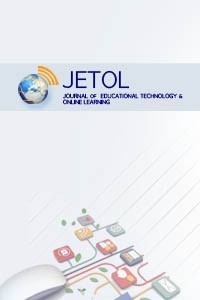Role of emerging technology on academic achievement of students at the University of Cape Coast
Role of emerging technology on academic achievement of students at the University of Cape Coast
Emerging technology, performance, academic achievement education, distractor,
___
- Ahmed, J. U., Chowdhury, Md. H. K., Rahman, S., & Talukder, A. K. M. M. H. (2014). Academic Probation: An empirical study of private university students. Research in Education, 92(1), 1–17.
- AlTameemy, F. (2017). Mobile phones for teaching and learning: Implementation and students’ and teachers’ attitudes. Journal of Educational Technology, 45(3), 437-451.
- Elohor, O. O. (2013). A technological approach to impactive learning. International Journal of Science and Research, 4(5), 901-912.
- Granito, M., & Chernobilsky, E. (2012). The Effect of Technology on a Student's Motivation and Knowledge Retention. NERA Conference Proceedings 2012. 17.
- Hartsell, T., Herron, S., Fang, H., & Rathod, A. (2009). Effectiveness of professional development in teaching mathematics and technology applications. Journal of Educational Technology Development and Exchange, 2(1), 53–56.
- Holotescu, C. (2015). A conceptual model for Open Learning Environments (Conference paper). Retrieve from https://www.researchgate.net/profile/Carmen_Holotescu/publication/ 282158171_A_conceptual_model_for_Open_Learning_Environments/links/5605c1fb08aea25fce3408cb/A-conceptual-model-for-Open-Learning-Environments.pdf?origin= publication_list&ev=srch_pub_xdl.
- Kim, S-H., & Kim J. K. (2016). Determinants of the adoption of mobile cloud computing services: a principal-agent perspective. Information Development, 34(1), 44-63.
- Krejcie, R. V., & Morgan, D. W. (1970). Determining sample size for research activities. Educational and Psychological Measurement, 30, 607-610.
- Liu, M., Hsieh, P., Cho, Y., & Schallert, D. (2006). Middle school students' self-efficacy, attitude, and achievement in a computer-enhanced problem-based learning environment. Journal of Interactive Learning Research, 17(3), 225-242.
- Mapotse, T. A. (2014). Action Research with Technology Education Teachers: Experiences Gained during Learners Projects Supervision Process. Mediterranean J. Social Sci., 5(2), 103-109.
- Ottevanger, W., Akker, J. J. H., & de Feiter, L. (2007). Developing Science, Mathematics and ICT education in sub-Saharan Africa (SMICT): Patterns and promising practices. Paper presented at the World Bank Working Paper.
- Ouyang, J. R., & Stanley, N. (2014). Theories and Research in Educational Technology and Distance Learning Instruction through Blackboard. Universal Journal of Educational Research, 2(2), 161-172.
- Prasad, A. N. (2016). Impact of Modern Technology on Higher Education Role of ICT in Language Teaching. Unpublished Paper: Department of Collegiate Education, Bangalore.
- Silva C. N. (2012). Encyclopaedia of Research Design “Ex Post Facto Study" SAGE Publications, Inc. Thousand Oaks. Retrieved 20/12/19 from https://methods. sagepub.com/base/download.xml
- Son, C., Kim, M., & Park, S. (2004). The case analysis of PDA integrated classroom. Proceedings of the Association for the Advancement of Computing in Education (AACE) SITE 2004 World Conference. Atlanta, Georgia.
- ISSN: 2618-6586
- Yayın Aralığı: Yılda 3 Sayı
- Başlangıç: 2017
- Yayıncı: Gürhan DURAK
Role of emerging technology on academic achievement of students at the University of Cape Coast
Paul NYAGORME, Desire Mawuko Komla AYİTE
Online Teaching Experiences of ELT Instructors
Burcu ŞENER, İnci SAĞLAM ERTEM, Ahmet MEÇ
Putri PUTRİ, Hermınarto SOFYAN
Teaching and Learning in resource-limited settings in the face of the COVID-19 pandemic
Online Learning in Higher Education during COVID-19 Pandemic: A case of Ghana
Edmond Kwesi AGORMEDAH, Eugene ADU HENAKU, Desire Mawuko Komla AYİTE, Enoch APORİ ANSAH
A Blueprint for In-Service Teacher Training Program in Technology Integration
Predicting Academic Achievement with Machine Learning Algorithms
Muhammed YILDIZ, Caner BÖREKCİ
The Use of Mobile-Based Augmented Reality in Science Learning to Improve Learning Motivation
Teacher candidate perceptions on alternative asynchronous online discussion boards
